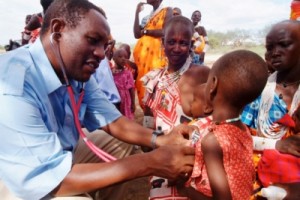A new report, Universal Health Coverage, published today by Oxfam, is warning that health insurance programs – being promoted by some donor agencies and governments in developing countries – are excluding the poorest and most vulnerable people.
The international agency says that usually only those who are already better-off are able to sign up, leaving the majority of citizens without cover and forcing the poorest to pay often huge, out of pocket expenses to get health care.
This misguided preoccupation with insurance is also leaving other funding methods largely unexplored. Improving tax collection, for example, could raise up to $269 billion a year*, giving developing countries the potential to double their health budgets. One reason countries are so keen to implement insurance is a false notion that it will generate extra money for health budgets, when in reality is raises very little.
Kevin Roussel, Head of Oxfam’s Essential Services Campaign, said: “Three people every second are forced below the poverty line because of catastrophic health care costs, but this obsession with insurance as the answer is leading poor countries down a blind alley.
“Most insurance programs are a lose-lose situation. They fail to reach the poorest people and yet collecting insurance premiums costs a huge amount to administer without raising any significant amounts of cash.”
For the African countries that have introduced health insurance, low levels of enrolment are proving to be a major and recurring challenge. Ghana’s National Health Insurance Scheme has been labeled a success but excludes 64 per cent of the population and the vast majority of these are poor people.
Ten years after it was introduced in Tanzania, only 17 per cent of the population has health insurance and Kenya’s National Hospital Insurance Fund covers only 18 per cent of Kenyans, despite the fact it was established nearly 50 years ago.
The international agency says developing countries are being derailed from achieving Universal Health Coverage (UHC) – a goal to make sure all citizens get the health services they need without suffering financial hardship – because governments, donors and multilaterals, including the World Bank and the UN’s International Labour Organization, have historically put too much emphasis on insurance programs as the solution, even though they have failed to improve access to health care for the poorest.Oxfam is calling on the World Bank, whose annual meetings take place in Washington later this week, to encourage governments to look for fairer ways to fund UHC, within the framework of President Jim Kim’s new strategy to end extreme poverty and boost shared prosperity.
Kevin Roussel said: “There is a huge danger that Universal Health Coverage becomes all about introducing health insurance programs and other fairer ways of funding health care are being left by the wayside.
“Universal Health Coverage should mean everyone gets the same financial protection and access to the same high quality health services, regardless of their employment status or ability to pay.”Oxfam’s report argues that even the poorest countries can increase revenue by improving existing tax collection systems, removing unnecessary tax exemptions and introducing new progressive taxes.
Gabon, for example, raised $30 million for health with a tiny levy on the profits of companies that handle remittances and a tax on mobile phone operators.
At the same time, global action to tackle tax dodging by multinational enterprises could save developing countries an estimated $160 billion a year – more than four times the amount spent on health care by all the governments in Sub-Saharan Africa combined.
Kevin Roussel said: “Countries should focus on finding home-grown health financing solutions that are universal and equitable. At the same time donors need to stop pushing unproven insurance programs which in many cases are actually reinforcing inequality.”











